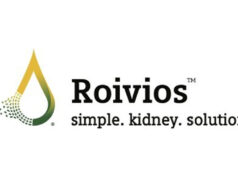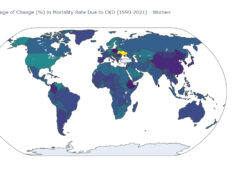 A simple blood test may predict the risk of progressive kidney and heart disease in people with type 2 diabetes and kidney disease, according to new research published in the American Heart Association’s journal Circulation.
A simple blood test may predict the risk of progressive kidney and heart disease in people with type 2 diabetes and kidney disease, according to new research published in the American Heart Association’s journal Circulation.
“High levels of certain biomarkers are indicators of heart and kidney complications and may help predict future risk of disease progression,” said lead author James Januzzi (Harvard Medical School, Cambridge, USA). “Treatment with canagliflozin, a sodium glucose co-transporter 2 (SGLT2) inhibitor, lowered biomarker levels and reduced the risk of hospitalisation for heart failure and other heart complications in people at the highest risk.”
Health professionals regularly measure biomarkers to screen, diagnose or treat specific conditions. Previous research has shown that concentrations of some biomarkers may predict the onset and progression of chronic kidney disease (CKD) as well as cardiovascular events in people with type 2 diabetes.
The researchers analysed biomarker data from the blood samples of 2,627 people who participated in the Canagliflozin and Renal Events in Diabetes with Established Nephropathy Clinical Evaluation (CREDENCE) trial to assess the effects of canagliflozin on concentrations of the four biomarkers from the study start, the one-year mark and the three-year mark.
They also examined the prognostic value of each biomarker on various levels of kidney problems, and risk of death due to kidney disease or cardiovascular disease. Patients were separated into low-, medium- and high-risk categories. People at highest risk showed dramatically higher rates of progressive kidney failure and cardiovascular complications throughout the three-year study period.
The analysis found that high concentrations of each biomarker at the beginning of the study were strongly predictive of the severity of the participant’s kidney and heart issues. The authors of the study also note that the concentrations of each of the four biomarkers in people taking canagliflozin were lower after one year and three years compared to those taking the placebo. After one year, they add, the levels of all biomarkers in participants who took canagliflozin rose 3% to 10%, compared to an increase of 6% to 29% in the those who took the placebo.
“It was reassuring to discover that canagliflozin helped reduce risks the most in people with the highest chances for complications. Future studies are needed to better understand how type 2 diabetes in conjunction with kidney disease develops and progresses so that we may initiate life-saving therapies earlier, before symptoms of heart and kidney disease have occurred.” Januzzi said. “Given that the American Heart Association/American College of Cardiology and the American Diabetes Association now all recommend measurement of biomarkers to enhance ability to predict risk in persons with type 2 diabetes, these results may considerably extend the reach of biomarker-based testing, refining accuracy even further.”
The study was limited in that not all study participants in the CREDENCE trial had available samples for biomarker measurement, and the participants with biomarker measurement may not be representative of the study’s entire population. Additionally, biomarker data over time were not complete, and some study participants had missing values during the study follow-up period. While prognostic thresholds for predicting the risk of kidney and heart complications in people with type 2 diabetes have been identified for two of the biomarkers, prognostic thresholds remain exploratory for the other two.












